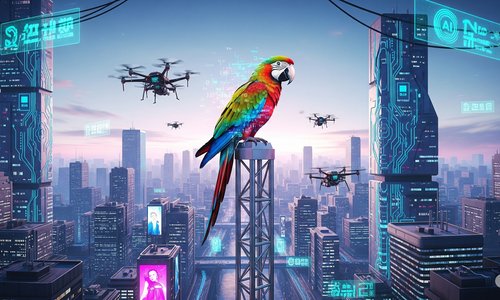
A Promessa e o Perigo da Nova Revolução Digital
A nova corrida tecnológica global levanta uma pergunta urgente: estamos prontos para confiar na inteligência que criamos?

O A.I. Act é uma tentativa de lidar com os riscos que a tecnologia representa para empregos, desinformação, viés e segurança nacional. Adam Satariano, correspondente de tecnologia europeia do The Times, tem relatado os esforços dos reguladores para estabelecer limites em torno da I.A. Ele falou com o DealBook sobre os desafios de regular uma tecnologia em rápido desenvolvimento, como diferentes países abordaram o desafio e se é possível criar salvaguardas eficazes para uma tecnologia sem fronteiras com vastas aplicações.
A União Europeia adotou uma abordagem "baseada em riscos", onde eles definem diferentes usos de I.A. que podem representar o maior potencial de dano para indivíduos e a sociedade - pense em uma I.A. usada para tomar decisões de contratação ou operar infraestruturas críticas como energia e água. Essas ferramentas enfrentam mais supervisão e escrutínio. Alguns críticos dizem que a política fica aquém porque é excessivamente prescritiva. Se algo não for listado como "alto risco", então não está coberto. A abordagem da União Europeia deixa muitas lacunas potenciais que os formuladores de políticas têm tentado preencher. Por exemplo, os sistemas de I.A. mais poderosos feitos por OpenAI, Google e outros serão capazes de fazer muitas coisas diferentes além de simplesmente alimentar um chatbot.
A I.A. mostra as diferenças mais amplas entre os EUA, a União Europeia e a China em termos de política digital. Os EUA são muito mais orientados pelo mercado e práticos. A América domina a economia digital, e os formuladores de políticas relutam em criar regras que ameacem essa liderança, especialmente para uma tecnologia potencialmente tão significativa quanto a I.A. O presidente Biden assinou uma ordem executiva impondo algumas limitações ao uso de I.A., especialmente no que se refere à segurança nacional e deepfakes. A União Europeia, uma economia mais regulamentada, está sendo muito mais prescritiva em relação às regras para a I.A., enquanto a China, com sua economia controlada pelo estado, está impondo seu próprio conjunto de controles com coisas como registros de algoritmos e censura de chatbots. O Reino Unido, o Japão e muitos outros países estão adotando uma abordagem mais prática, de esperar para ver.
Os benefícios e riscos futuros da I.A. não são totalmente conhecidos - para as pessoas que criam a tecnologia ou os formuladores de políticas. Isso torna difícil legislar. Portanto, muito trabalho está sendo feito para analisar a direção do desenvolvimento da tecnologia e estabelecer salvaguardas, seja para proteger infraestruturas críticas, prevenir discriminação e viés ou impedir o desenvolvimento de robôs assassinos.
A tecnologia parece estar avançando muito mais rapidamente do que os reguladores conseguem conceber e aprovar regras para controlá-la. Esta é provavelmente a resposta mais rápida que vi os formuladores de políticas ao redor do mundo darem a uma nova tecnologia. Mas ainda não resultou em muitas políticas concretas. A tecnologia está avançando tão rapidamente que está superando a capacidade dos formuladores de políticas de criar regras. Disputas geopolíticas e competição econômica também aumentam a dificuldade da cooperação internacional, que a maioria acredita ser essencial para que as regras sejam eficazes.
Advogado graduado na UFRJ com mais de 20 anos de experiência em direito trabalhando com empresas de telecom, internet, mídia e entretenimento, tendo trabalhado em empresas como Claro, Embratel, IG e UOL.
Pós graduado em Direito da Informação na Universidade Cândido Mendes, pós graduado em Estratégias Processuais na Advocacia Empresarial na FGV/SP e em Aspectos Políticos da União Europeia no INSPER/SP.
Foi General Manager e hoje é Global Board Member do Mobile Ecosystem Forum (MEF), fundador e consultor de Policies da MMA LATAM, além de ser Diretor da I2AI - Associação Internacional de Inteligência Artificial.

A nova corrida tecnológica global levanta uma pergunta urgente: estamos prontos para confiar na inteligência que criamos?

Por que dominar a IA será a nova alfabetização do século XXI

Conselhos de Administração devem evoluir da supervisão reativa para a antecipação estratégica, frente à crescente complexidade e volatilidade dos ambientes de negócios.

De 14 a 25 de julho, reserve suas manhãs das 08h00 às 09h30 para participar da tradicional Maratona I2AI! Uma jornada intensa com debates e palestras sobre temas essenciais: Ética,